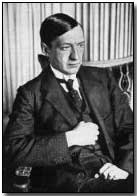Primary Documents - Alexander Kerenski on Military and Civil Unrest in Russia, 14 May 1917
 Reproduced below is the
text of an address given by the post-February Revolution Minister of
Justice,
Alexander Kerenski, on 14 May 1917.
Reproduced below is the
text of an address given by the post-February Revolution Minister of
Justice,
Alexander Kerenski, on 14 May 1917.
In his address Kerenski - who echoed the fears of War Minister Alexander Guchkov who spoke similarly four days earlier - openly expressed his fear that the Russian Army was on the verge of disintegrating. He argued that while Russia's military allies - including Britain, France, Italy and the U.S.A. - were continuing to fight successfully on their various fronts, Russia should likewise continue its fight on the Eastern Front, described by Kerenski as the "Allied Front".
He concluded his address by warning that the fate of the country lay in his hearer's hands, "and it is in most extreme danger".
Click here to read the Manifesto of the Council of Workmen and Soldiers dated 15 May 1917 on the same subject; click here to read a second statement dated 23 July 1917; and another dated 25 July 1917.
Alexander Kerenski on Military and Civil Unrest in Russia, 14 May 1917
I came to you because my strength is at an end.
I no longer feel my former courage, nor have my former conviction that we are conscientious citizens, not slaves in revolt. I am sorry I did not die two months ago, when the dream of a new life was growing in the hearts of the Russian people, when I was sure the country could govern itself without the whip.
As affairs are going now, it will be impossible to save the country. Perhaps the time is near when we will have to tell you that we can no longer give you the amount of bread you expect or other supplies on which you have a right to count. The process of the change from slavery to freedom is not going on properly. We have tasted freedom and are slightly intoxicated. What we need is sobriety and discipline.
You could suffer and be silent for ten years, and obey the orders of a hated Government. You could even fire upon your own people when commanded to do so. Can you now suffer no longer?
We hear it said that we no longer need the front because they are fraternizing there. But are they fraternizing on all the fronts? Are they fraternizing on the French front? No, comrades, if you are going to fraternize, then fraternize everywhere. Are not enemy forces being thrown over on to the Anglo-French front, and is not the Anglo-French advance already stopped? There is no such thing as a "Russian front," there is only one general allied front.
We are marching toward peace and I should not be in the ranks of the Provisional Government if the ending of the war were not the aim of the whole Provisional Government; but if we are going to propose new war aims we must see we are respected by friend as well as by foe.
If the tragedy and desperateness of the situation are not realized by all in our State, if our organization does not work like a machine, then all our dreams of liberty, all our ideals, will be thrown back for decades and maybe will be drowned in blood.
Beware! The time has now come when every one in the depth of his conscience must reflect where he is going and where he is leading others who were held in ignorance by the old regime and still regard every printed word as law.
The fate of the country is in your hands, and it is in most extreme danger. History must be able to say of us, "They died, but they were never slaves."
Source: Source Records of the Great War, Vol. V, ed. Charles F. Horne, National Alumni 1923
A Flechette was an anti-personnel dart dropped from an aircraft.
- Did you know?
